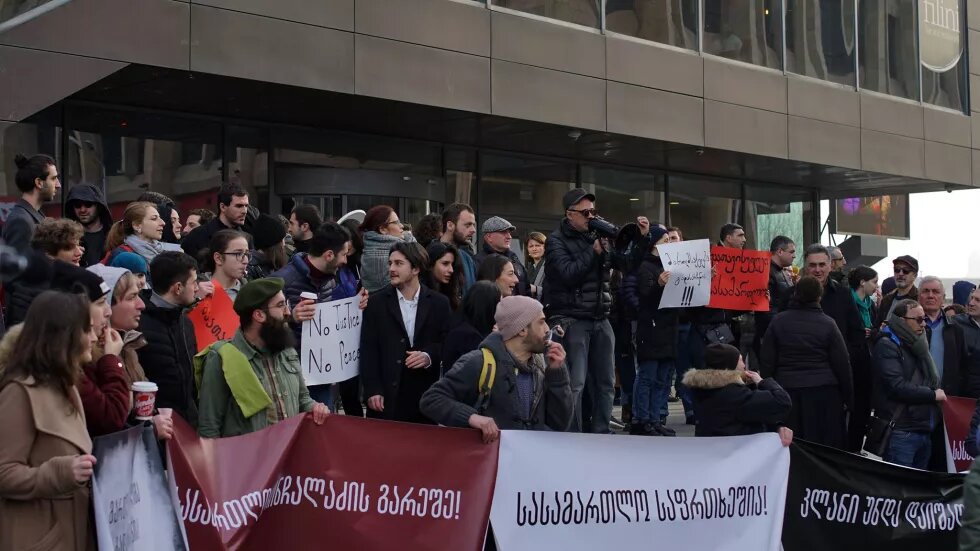On June 17th, Georgia received a clear message about the need to democratize its political system and independent institutions. The European Commission's assessment confirmed that excessive concentration of power and weak independent institutions are the main challenges to state governance. This article discusses the recent key developments that have led to a deteriorating quality of democracy and institutions in the country. A change in the existing logic of power remains an inevitable necessity for the further democratization of the country. A political system grounded in exclusion and single-party majority decisions must be replaced by a consensus-driven democracy, where an interest in reaching a consensus drives political and social groups.

Georgia has regressed in terms of democratic governance indicators, and this is largely due to weak independent institutions.[1] On the road to rapprochement with the EU, a key indicator of Georgia's assessment is its commitment to the principles of democratic governance. Political actors are examining this commitment through the attitudes toward the independence of non-partisan institutions.[2] The harsh political assessments of Georgia voiced at international forums of late reflect the recent hampering of independent institutions in the country. While some progress has been made in certain areas vis-a-vis human rights,[3] the situation with regard to institutional independence is worsening. The government's moves to hinder institutions have occurred in lockstep with its push to concentrate power leading to an erosion of democracy. The recent policies of the government undermine the declared goals and values of the country and present the country as an unreliable and unstable ally. The position of the European Commission, which recommended granting candidate status to Georgia provided that 12 conditions are met, may be related to the above.[4]
Democracy deficit and independent institutions
An intolerance for independent state institutions is characteristic of Georgia's modern political system. By independent state institutions, we mean supervisory or judicial bodies that, by their essence and purpose, are beyond the party agenda and set certain limitations on political power. In this very political context, most of the independent institutions in Georgia were established and continue to exist in the conditions of the deficit of democracy. In the process of consolidating power, the main targets of political attacks are usually the judiciary and other independent institutions, as they tame the political appetite of the ruling groups. Therefore, weakening them through institutional subordination becomes the main task of the government. The history of Georgia's independence and our memory holds many such episodes. It has somehow become a recurring feature of our political life. The political arrogance of every government was manifested, in the first place, in the weakening of independent institutions. That is why this crucial component of democratic governance has failed to institutionalize independence at any stage. The continuing hampering of institutions has threatened the existence of a functioning, democratic political system.
In a deficit of democracy, when all political, economic, or social capital is concentrated in the hands of a few, there are no institutional mechanisms for balancing power. At the same time, the organization and institutional arrangement of Georgian political life allow the political power that holds the majority, as a result of elections, to decide on virtually all key state issues unilaterally. An example of this today is the unilateral discretion of the parliamentary majority in the process of staffing the Supreme Court;[5] the election of the Prosecutor General by a single party decision;[6] the election of the head of the State Security Service, and the leaders of other independent or supervisory bodies by a single party decision.[7] In cases where a parliamentary majority needs to reach an agreement with the opposition, vacancies have yet to be filled.[8]
If we look at the Georgian Dream's reform strategy concerning independent institutions, it is clear that despite the abundance of reforms, the system of power has not changed in any way.[9] The Georgian Dream’s justice sector reform concept is grounded in majority rule: Parliament has changed the system through which judges are appointed, but at all stages, it has left the majority with the leverage to make that decision. Similarly, the Georgian Dream removed the Prosecutor General's Office from the Ministry of Justice on the grounds of depoliticizing the entity. However, it delegated the power to elect the Prosecutor General to its parliamentary majority. The same approach was used by Parliament in the State Security Service reform process. Following the separation of the agency from the Ministry of Internal Affairs, the capacity to elect and dismiss the head of the service remained with the parliamentary majority. In none of the key issues did the majority take a step towards consensus-driven democracy. The legal norms governing the political process have changed so that the content of the political process — that is, the organization of power — has not changed. This pattern once again demonstrated that despite the progressive image of specific changes, democratic reforms and the distribution of power conflicted with the party-driven interests of the government.
2021: The backsliding of democracy in Georgia
It is impossible to discuss the state of independent institutions in isolation from the political environment. Last year was a year of significant turbulence in Georgia in this regard, which logically had an impact on the institutional environment. That is why, when discussing the decline of democracy, several international reports, quite rightly, focus on the events of the second half of last year, which significantly worsened the institutional environment in Georgia.
The ruling party’s withdrawal from the April 19 agreement (A Way Ahead for Georgia) and its disregard of the agreements reached with the participation of the European Union clearly showed the weakness of the idea of democratization among its members. Additionally, the government had no political will to reform the justice system further. Moreover, after this decision, the ruling party continued to move against the spirit of the April 19 agreement, which was also evident in the process of staffing the court.[10] The Georgian Dream refused to implement a comprehensive and inclusive judicial reform, and continued to appoint judges to the Supreme Court in the existing unreliable and discredited system.[11] According to the report on the implementation of the Association Agreement, even the threat of losing EU financial assistance could not stop Georgia from violating its commitments concerning justice reform.[12] The Georgian Dream continued the demonstrative separation from international obligations and expectations by refusing financial assistance.
Although the Georgian government, at first glance, rejected the second tranche of macro-financial assistance from the EU, there is an opinion that this move was a tactic of sorts by the government, as it expected a refusal from the EU.[13] This reasoning was confirmed by the EU explanatory note, which stated that Georgia had not sufficiently fulfilled the preconditions set for financial assistance.[14]
Many of these preconditions were directed at the reform of independent institutions and were reflected in, inter alia, the April 19 agreement. The spirit of the agreement focused on a fundamental reform of the High Council of Justice and the model of appointment of judges, which would have changed the trend of perfunctory changes in recent years.[15] Also, in light of the existing polarization and crisis of confidence, the agreement provided for the development of reform through an open and inclusive process. Arguably, none of these preconditions concerning the justice system have been fully and conscientiously fulfilled.[16]
Prosecutorial Reform
The promise of reform of the Prosecutor's Office, the necessity of which is pointed out by several researchers, remains unfulfilled.[17] In the context of selective justice and political persecution, international organizations are also calling for increasing the independence of the Prosecutor's Office.[18] Also, references to politicized justice are made in the context of a number of ongoing cases against political opponents and representatives of the critical media.[19] In the face of these challenges, increasing the independence of the Prosecutor’s Office became part of the April 19 agreement. The first indicator of the prosecution system's political vulnerability is the Prosecutor General's rule of appointment. The Constitution allows the majority to elect a preferred candidate for Prosecutor General unilaterally. The ruling party does not need to share power and responsibility with anyone else. The April 19 agreement served to change this logic and foster the separation of powers. However, in September 2021, the Georgian Dream refused to implement this change.[20] The ruling party did not see the need to reform the prosecution system after leaving the April 19 agreement.
This positioning of the government reflected its attitude towards institutional reforms, which was also noticeable in other cases. The government did not consider the reforms as a necessary and inevitable step toward further democratization in Georgia but viewed them as a tactical step to maintain the political balance in the country. For example, in the justice system, the government made changes to the extent that would maintain its democratic image in the eyes of international observers. However, the scale of these reforms has almost never been such that they would form the basis of a real, democratic and consensus-based political system.
At the end of last year, the government’s open attack on independent institutions was a kind of a deviation from this pattern. In December 2021, almost simultaneously, the ruling majority abruptly initiated bills on the judiciary and the State Inspector's Service (an independent investigative mechanism) without any deliberations or participation. These pre-New Year initiatives of the Georgian Dream were demonstratively punitive and legally problematic.
With these changes, the Georgian Dream restored the mechanism of "forced" secondment of judges. It also reduced the number of votes needed to discipline judges,[21] which could have a chilling effect on the judicial corps. We must also consider the context of initiating the amendments. The drafting of the bill followed the incident where several judges’ publicly expressed their views in opposition of the group of influential judges supported by the government,[22] to which the political authorities responded by aggravating the legal environment for them.
Abolition of the State Inspector Service
The abolition of the State Inspector Service at the end of 2021 had a similar context. Shortly before the bill was initiated, the State Inspector's Office fined two government agencies in connection with the case of the third president. The State Inspector's Office also responded to some high-profile incidents and, throughout its two-year existence, merited a consistently positive assessment.[23] Against this background, the political aspect of the implemented changes were even more evident, especially considering that the inspector, who Parliament elected until 2025, had to vacate the office.
Such an attack on the Office of the State Inspector is even more severe because the system of accountability of law enforcement agencies in the country is feeble and the mechanisms for responding to violations committed are ineffective.[24] Despite some changes, the oversight function of the parliament over the security sector and law enforcement agencies remains weak.[25] The complete collapse of oversight and accountability mechanisms is evidenced by a number of uninvestigated cases involving infringement of privacy, unlawful surveillance, and wiretapping practices. One example of this concerns media reports in September 2021 about thousands of files allegedly obtained as a result of mass illegal surveillance, which the Georgian prosecutor's office is still investigating without any fruitful results.[26]
These punitive initiatives in December seemed to deviate from the modus operandi of the Georgian Dream, which had previously achieved its political goals through less grievous legal reforms. The backsliding of Georgian democracy was largely affiliated with the legislative changes made at the end of last year.[27]
Conclusion
Georgia's prospects for peaceful development and European integration depend on the democratization of its political system and the strength of its independent institutions. These conceptions are interrelated and largely conditioned by one another. While the history of independent functioning of institutions in the country is practically non-existent, political turbulence will inevitably impact the institutional environment. This is expected given that all political, governing, and other levers remain concentrated in the hands of one group, and accumulated power has no limitations.
Last year, once again, demonstrated to us how, in the face of such excessive and unaccountable power, even over a short period, the political environment may deteriorate and harm the state of independent institutions.
There are currently no viable ways out or promising solutions. However, when deliberating, it will be pertinent to remember that institutional democracy is closely linked to the distribution of power. The distribution of resources, power, shared responsibility, and accountability are vital components of an open and inclusive democratic system. Thus, the issue of independent bodies and institutional reforms is not a matter of design but of politics and power dynamics.
Therefore, our thinking on the democratization of the political system and strengthening of independent institutions should aim to alter the existing logic of power. This logic is currently exclusive and tailored to the one-party rule of the majority.
This logic can be replaced by the principle of consensus-based democracy, where political and social groups are driven by an interest in reaching an agreement with one another.[28] A consensus-based system in the context of institutional reforms implies the achievement of political neutrality and high legitimacy of institutions with multi-party and diverse consensus. This model is more inclusive and integration-focused.[29] Unlike a majority-driven government, it has the resources to select the best possible solutions for the public through the agreement of diverse groups. In this situation, the fate of independent institutions is based not on the will of a single political group but on segregated power.
The content of the publication is the sole responsibility of the author and can in no way be taken to reflect the views of the Heinrich Boell Foundation Tbilisi Office – South Caucasus Region.
[1] EPRS | European Parliamentary Research Service, Association Agreement Between the EU and Georgia, European Implementation Assessment (update), March 2022, p. 37, available at: https://bit.ly/3o79ues
[2] European Parliament, P9_TA(2022)0239, Violations of media freedom and safety of journalists in Georgia European Parliament resolution of 9 June 2022 on violations of media freedom and the safety of journalists in Georgia (2022/2702(RSP)), para. 18, available at: https://bit.ly/3yFCLBL
[3] EPRS | European Parliamentary Research Service, Associatioan Agreement Between the EU and Georgia, European Implementation Assessment (update), March 2022, p. 23, available at: https://bit.ly/3PePceQ
[4] EUROPEAN COMMISSION, COMMUNICATION FROM THE COMMISSION TO THE EUROPEAN
PARLIAMENT, THE EUROPEAN COUNCIL AND THE COUNCIL, Commission Opinion on Georgia's application for membership of the European Union, https://bit.ly/3aF6J0P
[5] Constitution of Georgia, Article 61, Paragraph 2.
[6] Constitution of Georgia, Article 65, Paragraph 2.
[7] Rules of Procedure of the Parliament of Georgia, Article 204, Paragraph 4.
[8] For example, the Parliament of Georgia has not yet elected five non-judge members of the High Council of Justice; Coalition for an Independent and Transparent Judiciary Responds to Scheduling a Conference of Judges, 29 October 2021, available at: https://bit.ly/3Oc4pfn
[9] GYLA, Justice System Reform in Georgia 2013-2021, available at: https://bit.ly/3z8bLfv
[10] Guram Imnadze, Waves of Judicial Reform Failing to Reach the Shores, 29 July 2021, available at: https://ge.boell.org/ka/2021/07/29/sasamartlo-repormis-talghebi-romlebi…
[11] Remarks by EU Ambassador Carl Hartzell following the appointment of two members of the High Council of Justice, 02.11.2021, available at: https://bit.ly/3Pq1LUe
[12] EPRS | European Parliamentary Research Service, Association Agreement Between the EU and Georgia, European Implementation Assessment (update), March 2022, p. 40, available at: https://bit.ly/3PsfE4m
[13] Netgazeti, Georgia Rejected EU Assistance It Could Not Receive, 31 August 2021, Available at: https://netgazeti.ge/news/561318/
[14] Remarks by EU Chargé d’Affaires ad interim, Julien Crampes on the notification by the Georgian Government to refrain from requesting the payment of EUR 75 million EU macro-financial assistance, 31 August 2021, available at: https://bit.ly/3PsWAmp
[15] GYLA, Justice System Reform in Georgia 2013-2021, p. 71, available at: https://bit.ly/3P9dEOx
[16] Open Society Foundation, Evaluation of the Implementation of the Agreement "A Way Ahead For Georgia", Tbilisi 2021, available at: https://bit.ly/3PwlFgA
[17] Social Justice Center, What Needs to Change in the Prosecution System, 2021, available at: https://bit.ly/3PcIhCL
[18] US Department of State, 2021 Country Reports on Human Rights Practices: Georgia, available at: https://bit.ly/3IDJf8S
[19] Amnesty International, The State of the World’s Human Rights, Amnesty International’s Annual Report 2021/22, available at: https://bit.ly/3o44Opo
[20] Social Justice Center, Changing the Rules for Appointing the Prosecutor General is Necessary for the Agency's Independence and Neutrality, 2021, available at: https://bit.ly/3P9McR2
[21] Coalition for an Independent and Transparent Judiciary Calls on the President to Veto Amendment to the Legislative Amendment to the Organic Law on Common Courts, 2022, available at: https://bit.ly/3IEjcye
[22]Netgazeti, 16 Judges Dissent Criticism of Embassies by Judges, 5 November 2021, available at: https://netgazeti.ge/law/573920/
[23] Statement by NGOs regarding the possible abolition of the State Inspector Service, 2021, available at: https://bit.ly/3aGXCN2
[24] Human Rights Watch, World Report 2022, available at: https://bit.ly/3RMT60i
[25] GYLA, Parliamentary Oversight After the Reform of the Constitution and the Protocol, 2020, available at: https://cutt.ly/eKkPMIp
[26] Statement of non-governmental organizations: investigation by the prosecutor's office on the wiretapping case is not effective, 2022, available at: https://bit.ly/3IJ0sNW
[27] US Department of State, 2021 Country Reports on Human Rights Practices: Georgia, available at: https://bit.ly/3uPx3w1; Amnesty International, The State of the World’s Human Rights, Amnesty International’s Annual Report 2021/22, available at: https://bit.ly/3uMl8is
[28] Vakhushti Menabde, Sopho Verdzeuli, 2021, A New Theory of Change for Failed Judicial Reform, available at: https://civil.ge/ka/archives/426499
[29] Vakhushti Menabde, The End of Politics | Staffing of the Supreme Court of Georgia – visions around status quo and the reform prospects, available at: https://bit.ly/3yLjXku


